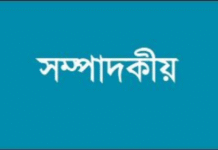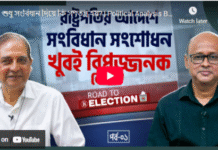Mohammad Auwal
FOR weeks now the International Crimes Tribunals (ICTs) in Bangladesh have been handing down sentences of life in prison or death to Islamic opposition leaders accused of having committed war crimes. They have recently announced a death sentence for Delwar Hossain Sayeedi, one of the most eminent interpreters of the Holy Qur’an in the country.
Sayeedi is a senior member of the Bangladesh Jamaat-e-Islami (BJI). Until 1973, he was not involved with any political party, and no charge has been filed against him in the 40 years since the 1971 war that led to the independence of Bangladesh.
Controversial from the very start, the trials have triggered waves of protests throughout the country. The ruling Awami League (AL) government has been crushing the protests against the trials through police brutality (beatings, arrests, torture, and shooting to maim/kill) and by means of a sustained campaign of dehumanization and symbolic manslaughter.
Using the state police, RAB (rapid action battalion, an armed forces unit), and armed party gangs, the rulers have killed dozens and maimed/jailed thousands of members of BJI and its student wing Islami Chhatra Shibir (ICS), many without trials. Videos and other images of government repression are too shocking to watch.
To add fuel to the fire, the AL government has engaged the state media and its massive partisan press in a 24/7 campaign to demonize BJI and ICS activists in the public’s eyes. For weeks now, they have staged what is known as the Shahbag movement—a gathering of party loyalists and other loyal leftist groups posing as new generation activists at a major intersection of Dhaka—as a predictable charm offensive in this rhetorical campaign. The Shahbagies have been chanting the AL party-line fascist slogans demanding execution of, not justice for, the accused.
The Sayeedi verdict was predictable, as revealed in the Skype scandal in which Justice Nizamul Haque Nasim, who led the tribunal trying Sayeedi, was exposed collaborating with ruling party officials and receiving the draft verdict of the trials from a Brussels-based lobbyist on October 14, 2012, about a month before the hearings were to be concluded.
The loyal protesters at Shahbag also must have known the verdict. Well ahead of the judicial announcements, they announced their plans to celebrate Sayeedi’s death verdict on Facebook and other social media sites.
The Sayeedi death verdict has finally proven beyond a reasonable doubt that the ICTs are nothing more than kangaroo courts. They represent a complete abomination of justice.
This is my assessment of the ICTs of Bangladesh from the perspective of justice that is fair and based on truth and good reasons, not based on emotions and politics. Like Malcolm X, “I’m for truth, no matter who tells it. I’m for justice, no matter who it’s for or against.”
“There is a heaven-and-earth difference, a day-and-night difference” between the standards of justice between the current ICTs of Bangladesh and the international criminal tribunals, according to TH Khan, the Bangladeshi justice who served on the International Criminal Tribunal for Rwanda (ICTR).
First, the ICTs in Bangladesh are not “international” at all. There is no international representation in the ICTs whatsoever. They are trying citizens of Bangladesh, not internationals; there are no international judges appointed to the tribunals and international lawyers have been barred from assisting the defense.
Second, these ICTs are historically absurd, and the government does not really have a case for war crimes, according to Khandaker Mahbub Hossain, the Chief Public Prosecutor of Bangladesh during the 1972-75 rule of Sheikh Mujibur Rahman and currently president of the Supreme Court Bar Association in Dhaka. Hossain has challenged the government to get the United Nations involved in the trials, following the examples of the UN supported international criminal tribunals for Bosnia and Rwanda.
Third, the statute (ICTA) that formed the ICTs has corrupted the principle of procedural justice, i.e., the fairness of the processes leading to outcomes. According to John Rawls’ theory of justice, once procedural justice is ensured, both distributive justice (fairness in the distribution of rights or resources) and retributive justice (fairness in the punishment of wrongs) can be achieved.
According to several academic studies, the ICTA has subverted procedural justice by denying the accused the right to question biases in the appointment of judges of the ICTs. Judges with backgrounds of anti-BJI political activism like Justice Nizamul Haque Nasim and those guilty of criminal activities have been appointed to the tribunals. In the US or any fair justice system, they would not be allowed to serve even as members of a jury.
Even after the recent Skype scandal, the ICTs are strangely doing business as usual relying not on ethics but on the logic of power.
Fourth, the ICTs deny the accused the fundamental rights guaranteed in the constitution of Bangladesh, according to international lawyers like David Bergman, Toby Cadman, and Stephen Kay who have studied the statute. ICTA bars the accused from challenging unconstitutional laws and curbs their rights to the protection of the law or against the retroactive application of the law. The constitution, however, bars the state from making any law that is inconsistent with the fundamental rights guaranteed in Part III of the Constitution and states that “any law so made shall to the extent of such inconsistencies be void” (Article 26)(2), unless ultimately vetted by a referendum.
After the recent verdict on Abdul Quader Molla, the government retroactively changed the law again so that the prosecution could appeal against what the loyal Shahbag protesters were calling a much too lenient verdict.
Fifth, ICTA has outlawed the fundamental rules of evidence in the trials, suspending the application of the Evidence Act (1872) as well as its innocent-until-proven-guilty provision and allowing the use of hearsay and newspaper reports (not admissible in international courts) as evidence.
As a result, most of the pro-prosecution witness accounts were hearsay. The prosecution in the Sayeedi case was allowed to produce the bulk of its witness narratives without producing the witnesses for cross-examination in the tribunals. When prosecution witnesses declined to give testimonies following the given scripts, they were barred from appearing in the courts.
In the Sayeedi case, for example, plainclothes security officials picked up a key defense witness from the entrance to the court and his family has not heard from him since. This disappearance and other forms of intimidation of witnesses fit the pattern of “goom” (forced disappearance) or killing of opposition politicians and journalists during the current AL rule.
Several times when the tribunal justices found the prosecution cases to have no merit, they returned the files to the prosecution, asking them to rework and resubmit the dossiers. This suggests that the tribunals were also serving as consultant attorneys for the prosecution.
International bodies, such as Amnesty International, Human Rights Watch, and the International Center for Transitional Justice have denounced these show trials. Now is the time for international governments to speak out and stand up and be counted.
Dr. Martin Luther King said: “Injustice anywhere is a threat to justice everywhere,” and Rabindranath Tagore wrote: “Your hatred should burn like hay fire those who inflict injustice and those who tolerate it.”
Accordingly, imagine what will happen if we fail to end or condemn the monstrous injustice being doled out by the kangaroo courts in Bangladesh today.
— Mohammad Auwal, professor in the Department of Communication Studies at California State University, Los Angeles, served as a Civil Service official in Bangladesh before moving to the US in the early 1990s. He can be reached at: mauwal@gmail.com
Source: Saudi Gazette










Truth will come out. Somebody has to say the thruth. Dear Mr. Awal, you have done that.
Keeping all others aside, Moulana Saidee was seen delivering his lectures in ‘Tafsir Mahfils’ arranged by local leaders at so many places of Bangladesh since 1973 during the rule of Bangabandhu. But the accusations now substantiated by the ICT were never heard of about him then. This seems very, very strange to a very large number of people. Truly strange it is!